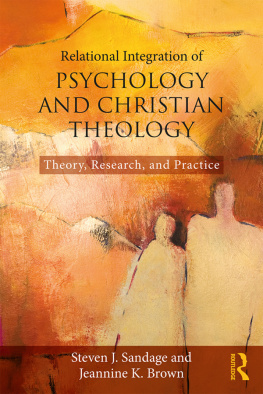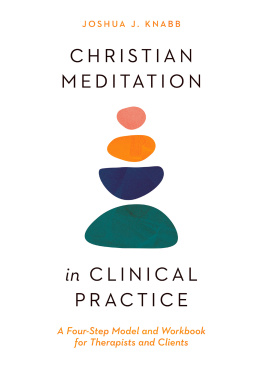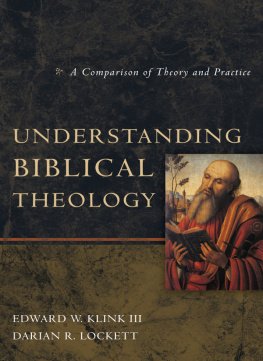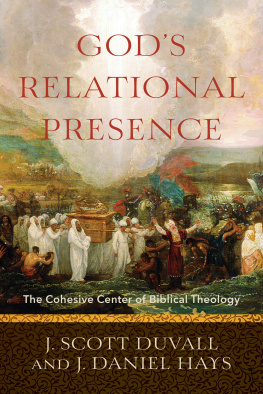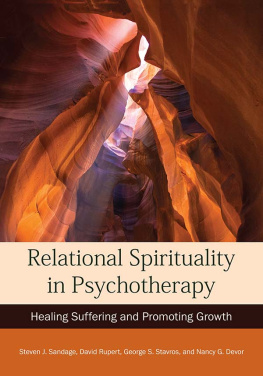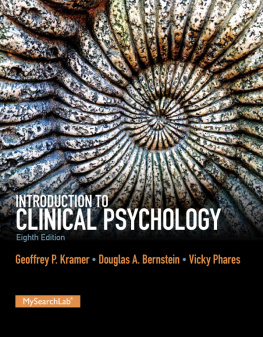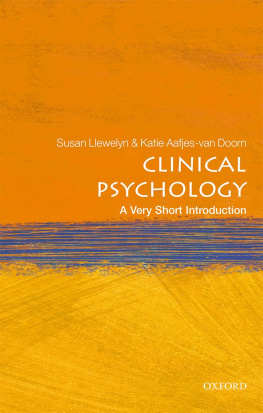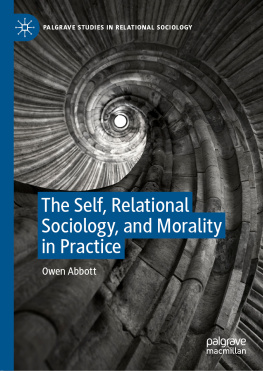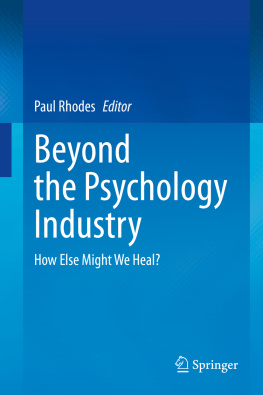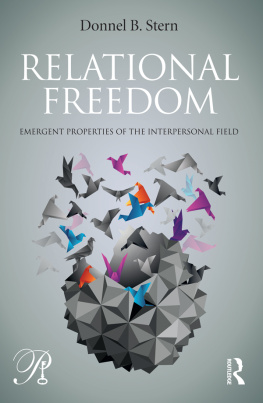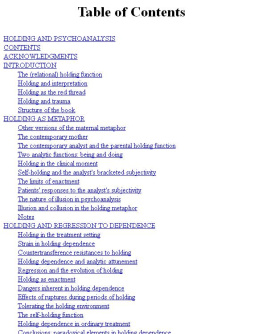Relational Integration of Psychology and Christian Theology
Relational Integration of Psychology and Christian Theology offers an in-depth, interdisciplinary relational framework that integrates theology, psychology, and clinical and other applications. Building on existing models and debates about the relationship between psychology and theology, the authors provide a much-needed examination of the actual interpersonal dynamics of integration and its implications for training and clinical practice. Case studies from a variety of clinical and educational contexts illustrate and support the authors model of relational integration. Using an approach that is sensitive to theological diversity and to social context, this book puts forward a theological and therapeutic framework that values diversity, the repairing of ruptures, and collaboration.
Steven J. Sandage, PhD, is Albert and Jessie Danielsen Professor of Psychology of Religion and Theology at Boston University School of Theology, with a joint appointment in the Department of Psychological and Brain Sciences. He also serves as research director and senior staff psychologist at the Danielsen Institute at Boston University.
Jeannine K. Brown, PhD, is professor of New Testament at Bethel Seminary in St. Paul, Minnesota, and San Diego, California.
Relational Integration of Psychology and Christian Theology
Theory, Research, and Practice
Steven J. Sandage and Jeannine K. Brown

First published 2018
by Routledge
711 Third Avenue, New York, NY 10017
and by Routledge
2 Park Square, Milton Park, Abingdon, Oxon, OX14 4RN
Routledge is an imprint of the Taylor & Francis Group, an informa business
2018 Steven J. Sandage and Jeannine K. Brown
The right of Steven J. Sandage and Jeannine K. Brown to be identified as authors of this work has been asserted by them in accordance with sections 77 and 78 of the Copyright, Designs and Patents Act 1988.
All rights reserved. No part of this book may be reprinted or reproduced or utilised in any form or by any electronic, mechanical, or other means, now known or hereafter invented, including photocopying and recording, or in any information storage or retrieval system, without permission in writing from the publishers.
Trademark notice: Product or corporate names may be trademarks or registered trademarks, and are used only for identification and explanation without intent to infringe.
Library of Congress Cataloging-in-Publication Data
Names: Sandage, Steven J., author. | Brown, Jeannine K., 1961- author.
Title: Relational integration of psychology and Christian theology : theory, research, and practice/Steven J. Sandage, Jeannine K. Brown.
Description: New York, NY : Routledge, 2018. | Includes bibliographical references.
Identifiers: LCCN 2017044441 (print) | LCCN 2017045057 (ebook) | ISBN 9781315671505 (eBook) | ISBN 9781138935921 (hardback) | ISBN 9781138935938 (pbk.) | ISBN 9781315671505 (ebk)
Subjects: | MESH: Psychotherapy | Religion and Psychology | Christianity | Cultural Diversity
Classification: LCC RC480.5 (ebook) | LCC RC480.5 (print) | NLM WM 460.5.R3 |
DDC 616.89/14dc23
LC record available at https://lccn.loc.gov/2017044441
ISBN: 978-1-138-93592-1 (hbk)
ISBN: 978-1-138-93593-8 (pbk)
ISBN: 978-1-315-67150-5 (ebk)
Typeset in Bembo
by Apex CoVantage, LLC
To Carla Dahl, who embodies the interdisciplinary virtues of curiosity, humility, and hospitality
Contents
We are dedicating this book to Carla Dahl, who has been a key mentor and friend to both of us, but also an exemplar of relational integration. We were each formed by team teaching integrative courses with Carla at Bethel Seminary, along with many informal conversations and moments. Its clich but true to say that relational integration is more caught than taught. Carlas profound integrative wisdom is closely matched by her huge heart and Olympic-level sense of humor. Carlas leadership, which moved her over many years from faculty secretary to a dean position at Bethel Seminary, put in place the integrative ecology that led to our collaboration on this project.
Leland Eliason was Provost at Bethel Seminary during some of our shared time there, and Leland fostered an integrative vision of theological education which also shaped the ethos that contributed to our development as integrative scholars and educators. Lelands personal commitment to integration was catalyzing and inspiring to our efforts.
We both also enjoyed integrative collaborations with many faculty, staff, and student colleagues at Bethel, including interdisciplinary scholarly projects, team teaching integration seminars, and working on administrative or committee efforts aimed at different aspects of integration. Special shared gratitude goes to Kyle Roberts, Mary Jensen, Peter Vogt, Mark Harden, Mark McCloskey, and Thorsten Moritz for so many highly textured relationally integrative influences. Too many students to name have engaged in integrative dialogues, assignments, and projects that have stimulated our learning about relational integration. We appreciate all these collective influences.
In this book, we describe some parts of our personal journeys of integration. But we each want to briefly acknowledge some key influences here, especially since this is a book about relational influences on integration.
Jeannines Acknowledgments
I am grateful for the great number of colleagues and friends who have shaped my integrative journey. An early influence was Dr. Al Wolters, who gave a lecture at a conference on Scripture and the Disciplines in 2004, for which I was a respondent. His gracious hospitality toward my questions and insights before and during that conference set a wonderful tone for other integrative interactions to come. A more recent influence is my daughter Katherine Agre, a genetic counselor at the Mayo Clinic. It is my greatest joy to do integration with such an amazing clinician whose expertise in areas far different from mine has such interesting implications for theological reflection.
Carla Dahl, whom we have already mentioned, has provided for me the most formative influence for integration. As a colleague and friend, she was the person I trusted to look at my first attempts at integration from the Gospel of Matthew. Our team teaching on the topic of the Gospels and formation remains a highlight over a decade later. I am grateful for the grant that Carla and I received, along with Wyndy Corbin Reuschling, from the Lilly Theological Research Grants program of the Association of Theological Schools in 200910, that helped the three of us write Becoming Whole and Holy: An Integrative Conversation about Christian Formation. It was a delight to have Wyndy join our work, as an expert in ethics and a true exemplar of relational integration.
Two other influential colleagues and conversation partners across disciplines have been Peter Vogt (Old Testament) and Kyle Roberts (Theology). Both have demonstrated the humility and curiosity that have made for fruitful and fascinating dialogue. Kyle has been a co-author on a forthcoming theological commentary on Matthew (Two Horizons series), and I am grateful for his partnership and friendship in that process. So many other colleagues have graciously joined my classes to offer their cross-disciplinary perspectives and/or invited me into theirs, including Denise Muir Kjesbo (Ministry Leadership), Mark McCloskey (Ministry Leadership), Mary Jensen (Formation), Ben Lim (Marital and Family Therapy), and Norah Caudill (Old Testament). I have recently enjoyed team-teaching Bethels Senior Integration Seminar (first taught with Steve) with Jim Smith, who has enriched the conversations in that course with his wide-ranging interests from church history to baseball history to pastoral leadership. I would also thank all the students who were a part of integrative courses I have taught; they have contributed profoundly to my growth as an integrator.

